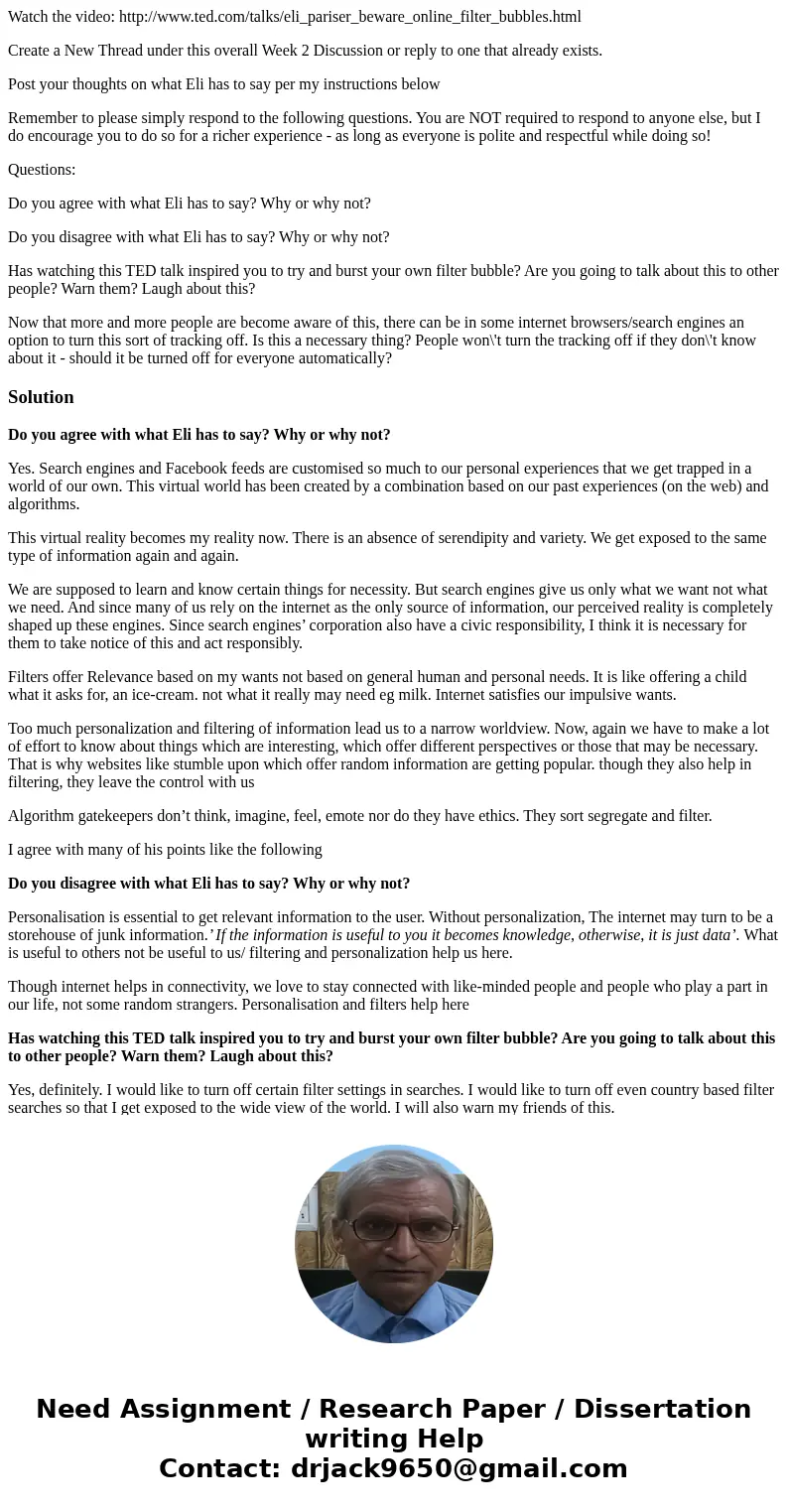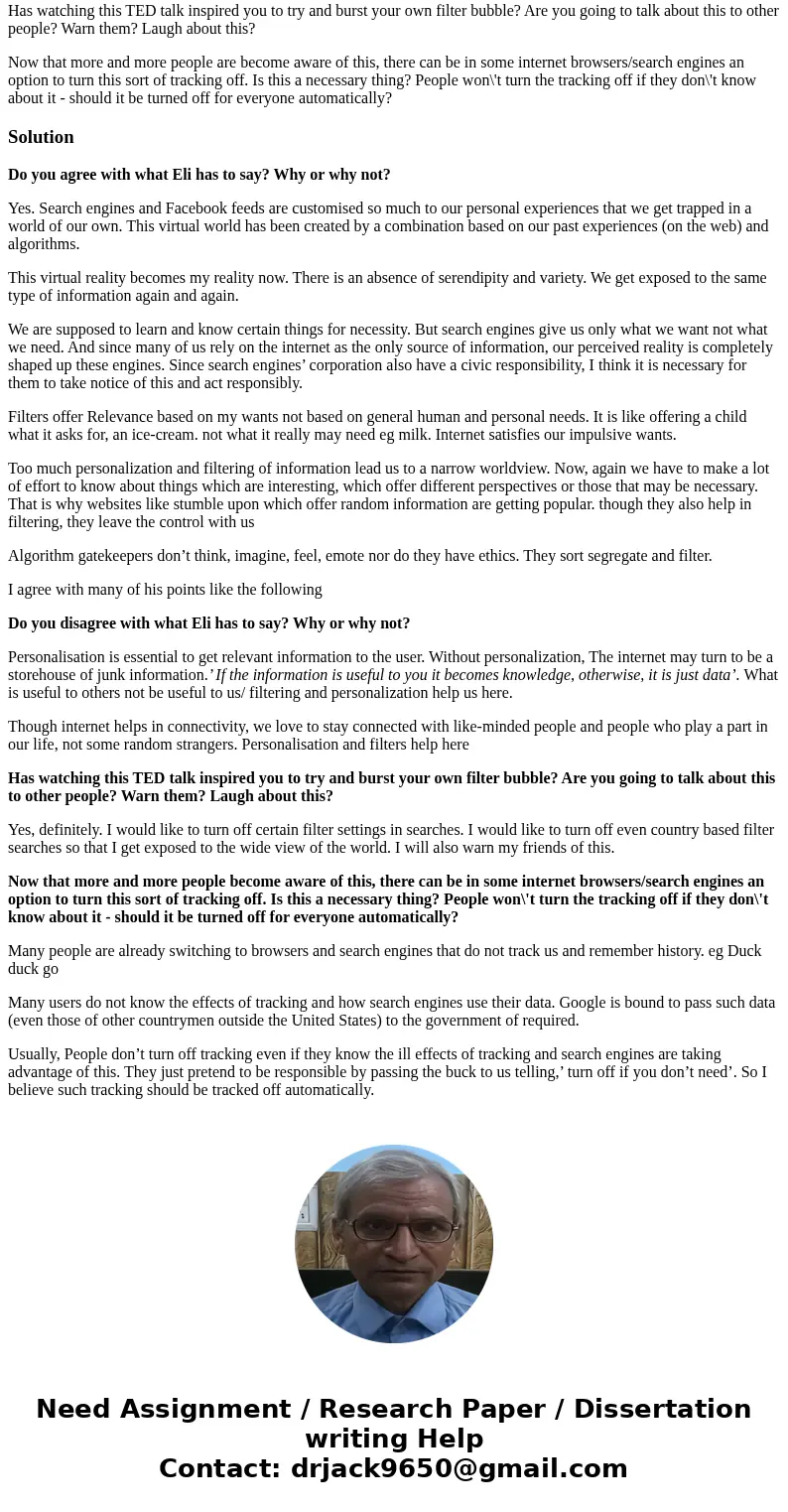Watch the video httpwwwtedcomtalkselipariserbewareonlinefilt
Watch the video: http://www.ted.com/talks/eli_pariser_beware_online_filter_bubbles.html
Create a New Thread under this overall Week 2 Discussion or reply to one that already exists.
Post your thoughts on what Eli has to say per my instructions below
Remember to please simply respond to the following questions. You are NOT required to respond to anyone else, but I do encourage you to do so for a richer experience - as long as everyone is polite and respectful while doing so!
Questions:
Do you agree with what Eli has to say? Why or why not?
Do you disagree with what Eli has to say? Why or why not?
Has watching this TED talk inspired you to try and burst your own filter bubble? Are you going to talk about this to other people? Warn them? Laugh about this?
Now that more and more people are become aware of this, there can be in some internet browsers/search engines an option to turn this sort of tracking off. Is this a necessary thing? People won\'t turn the tracking off if they don\'t know about it - should it be turned off for everyone automatically?
Solution
Do you agree with what Eli has to say? Why or why not?
Yes. Search engines and Facebook feeds are customised so much to our personal experiences that we get trapped in a world of our own. This virtual world has been created by a combination based on our past experiences (on the web) and algorithms.
This virtual reality becomes my reality now. There is an absence of serendipity and variety. We get exposed to the same type of information again and again.
We are supposed to learn and know certain things for necessity. But search engines give us only what we want not what we need. And since many of us rely on the internet as the only source of information, our perceived reality is completely shaped up these engines. Since search engines’ corporation also have a civic responsibility, I think it is necessary for them to take notice of this and act responsibly.
Filters offer Relevance based on my wants not based on general human and personal needs. It is like offering a child what it asks for, an ice-cream. not what it really may need eg milk. Internet satisfies our impulsive wants.
Too much personalization and filtering of information lead us to a narrow worldview. Now, again we have to make a lot of effort to know about things which are interesting, which offer different perspectives or those that may be necessary. That is why websites like stumble upon which offer random information are getting popular. though they also help in filtering, they leave the control with us
Algorithm gatekeepers don’t think, imagine, feel, emote nor do they have ethics. They sort segregate and filter.
I agree with many of his points like the following
Do you disagree with what Eli has to say? Why or why not?
Personalisation is essential to get relevant information to the user. Without personalization, The internet may turn to be a storehouse of junk information.’ If the information is useful to you it becomes knowledge, otherwise, it is just data’. What is useful to others not be useful to us/ filtering and personalization help us here.
Though internet helps in connectivity, we love to stay connected with like-minded people and people who play a part in our life, not some random strangers. Personalisation and filters help here
Has watching this TED talk inspired you to try and burst your own filter bubble? Are you going to talk about this to other people? Warn them? Laugh about this?
Yes, definitely. I would like to turn off certain filter settings in searches. I would like to turn off even country based filter searches so that I get exposed to the wide view of the world. I will also warn my friends of this.
Now that more and more people become aware of this, there can be in some internet browsers/search engines an option to turn this sort of tracking off. Is this a necessary thing? People won\'t turn the tracking off if they don\'t know about it - should it be turned off for everyone automatically?
Many people are already switching to browsers and search engines that do not track us and remember history. eg Duck duck go
Many users do not know the effects of tracking and how search engines use their data. Google is bound to pass such data (even those of other countrymen outside the United States) to the government of required.
Usually, People don’t turn off tracking even if they know the ill effects of tracking and search engines are taking advantage of this. They just pretend to be responsible by passing the buck to us telling,’ turn off if you don’t need’. So I believe such tracking should be tracked off automatically.


 Homework Sourse
Homework Sourse